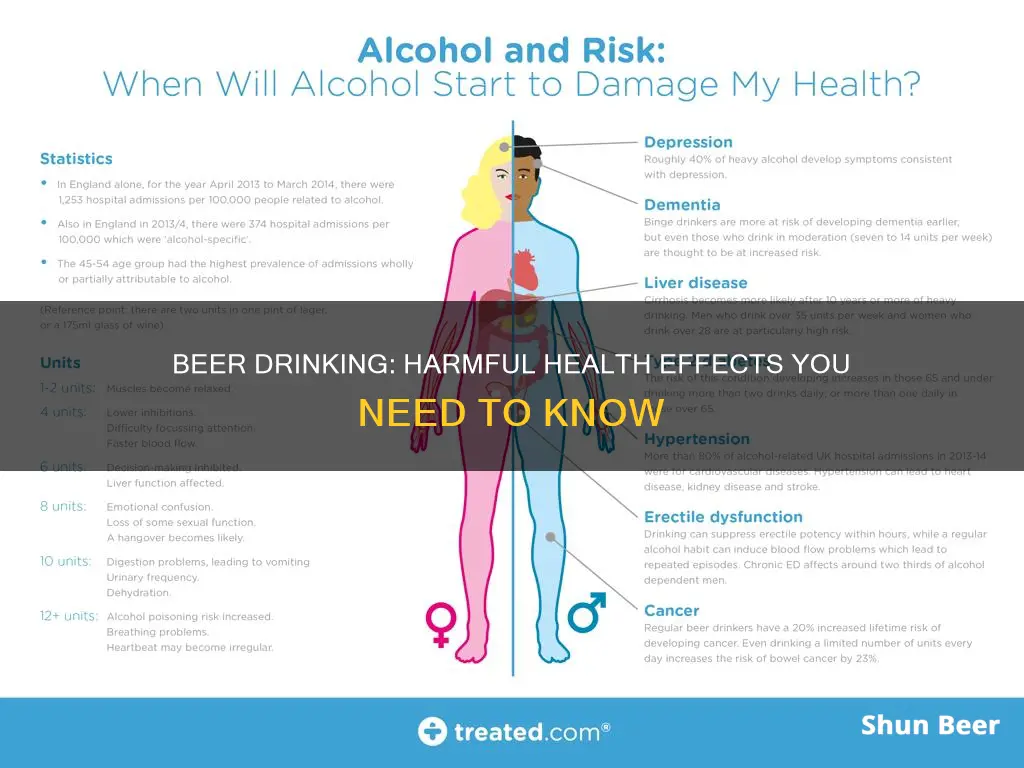
Beer is a popular alcoholic drink made from fermented cereal grains, hops, yeast, and other flavouring agents. It typically contains 4-6% alcohol, but this can range from 0.5-40%.
Drinking beer can have both positive and negative effects on your health. On the one hand, moderate consumption may have benefits for your heart, bones, blood sugar, and dementia risk. On the other hand, heavy drinking increases your risk of depression, weight gain, liver disease, and certain types of cancer.
The World Health Organization has stated that there is no safe amount of alcohol consumption when it comes to health. Even light and moderate drinking can cause several types of cancer, and the risk increases with the amount consumed.
Overall, while drinking beer may have some potential health benefits, it is important to consume it in moderation and be aware of the potential risks associated with excessive drinking.
| Characteristics | Values |
|---|---|
| Positive Effects | May aid your bone density |
| May improve memory and thinking skills | |
| May reduce the risk of heart failure and fluid build-up in the body | |
| May reduce the risk of developing type 2 diabetes | |
| May reduce the risk of airway infections caused by exercise | |
| May improve bone mass in postmenopausal adults | |
| May reduce the risk of death from any cause in people who are middle-aged and older | |
| Negative Effects | May disrupt your sleep |
| May slow down your weight-loss process | |
| May cause digestive issues | |
| May increase your risk of chronic diseases |
What You'll Learn

Increased risk of chronic diseases
Beer drinking can increase the risk of chronic diseases, including several types of cancer, cardiovascular diseases, liver diseases, and early death.
Cancer
According to the World Health Organization, alcohol is a toxic, psychoactive, and dependence-producing substance and has been classified as a Group 1 carcinogen. Ethanol (alcohol) causes cancer through biological mechanisms as the compound breaks down in the body, which means that any beverage containing alcohol, regardless of its price and quality, poses a risk of developing cancer. Alcohol causes at least seven types of cancer, including the most common cancer types, such as bowel cancer and female breast cancer. The risk of developing cancer increases substantially the more alcohol is consumed. However, the latest available data indicates that half of all alcohol-attributable cancers in the WHO European Region are caused by "light" and "moderate" alcohol consumption.
Cardiovascular Diseases
Excessive alcohol consumption acts as a toxin to the heart and vascular system and may also exacerbate pre-existing heart disorders. However, light to moderate amounts of alcohol intake might have beneficial effects on the cardiovascular system, as it increases high-density lipoprotein cholesterol (HDL) and reduces arterial stiffness. Nevertheless, heavy and binge drinking can counter these benefits and significantly increase the risk of heart disease and stroke.
Liver Diseases
Research suggests that drinking more than 30 grams of alcohol, which is found in two to three 12-ounce or 355-mL bottles of beer, daily can raise the risk of liver diseases like cirrhosis, a condition characterized by scarring.
Early Death
Heavy and binge drinkers have a higher risk of early death than moderate drinkers and nondrinkers.
Invisalign and Beer: What You Need to Know
You may want to see also

May cause digestive issues
Beer is made by fermenting sugars from starches, such as barley, hops, water, and yeast. It can be alcoholic or non-alcoholic. Alcoholic beer is likely safe for most adults when consumed in moderation (two 12-ounce glasses daily). However, drinking higher amounts of alcoholic beer can cause digestive issues, including abdominal pain, bloating, and diarrhea.
"Alcohol is first broken down in the stomach, promoting an increase in digestive juices," says Kimberly Gomer M.S., RD, LDN. "Alcohol also irritates the small intestine and colon where it is further broken down and absorbed, and it also can affect the normal speed that food moves through them, which may result in abdominal pain, bloating, and diarrhea."
When consumed in large amounts, alcohol can cause intestinal inflammation and issues within the gastrointestinal tract and the liver. Alcohol can negatively alter the bacteria in your gut and permeate the lining of the intestine (leaky gut syndrome), making the body even more susceptible to alcohol-related diseases, including alcoholic fatty liver disease.
Muslims and Alcohol-Free Beer: Is it Allowed?
You may want to see also

Can slow down weight loss
Beer drinking can slow down weight loss. Here's how:
Beer is made by fermenting sugars from starches such as barley, hops, water, and yeast. It can be alcoholic or non-alcoholic. Alcoholic beer typically has an alcohol by volume (ABV) of under 5%, but some beers can be much higher. When consumed, alcohol is prioritised by the liver for metabolisation, as it is recognised as a toxin. This means that if you are trying to lose weight, the fat-burning process is slowed down as the liver deals with the alcohol first.
Drinking beer in moderation has been linked to a reduced risk of developing type 2 diabetes and heart disease. However, drinking more than two 12-ounce glasses of alcoholic beer daily is deemed unsafe and can lead to serious health problems, including liver disease and certain types of cancer.
The World Health Organization (WHO) has stated that there is no safe amount of alcohol consumption when it comes to health. Alcohol is a toxic, psychoactive, and dependence-producing substance and has been classified as a Group 1 carcinogen. It causes at least seven types of cancer, including bowel cancer and female breast cancer. The risk of developing cancer increases with the amount of alcohol consumed.
In conclusion, while drinking beer in moderation may have some health benefits, it is important to note that it can also slow down weight loss and lead to serious health issues when consumed in excess.
Beer and Alpha-Gal: What You Need to Know
You may want to see also

Could disrupt your sleep
Beer is popularly known for its ability to make consumers feel relaxed and experience feelings of euphoria. However, the alcohol in beer can affect the brain's long-term health. It can slow down reflexes and impair balance, memory, and sleep.
The National Institute on Alcohol Abuse and Alcoholism states that alcohol can affect the brain's communication pathways and its ability to process information. Even light amounts of alcohol can impair sleep quality. The liver metabolises alcohol, which can result in a fitful night of sleep.
According to Kimberly Gomer M.S., RD, LDN, "The alcohol in beer can affect the brain so that reflexes are slowed down, and [your] balance, memory and sleep may be impaired."
Beer and Anemia: Is It Safe to Drink?
You may want to see also

May increase risk of cancer
Beer drinking can increase the risk of cancer. Alcohol is a known human carcinogen, and beer, like all alcoholic beverages, contains ethanol or ethyl alcohol. When the body breaks down ethanol, it produces acetaldehyde, a toxic chemical and probable human carcinogen that can damage DNA and prevent cells from repairing that damage, allowing cancerous cells to grow.
The more alcohol a person drinks, particularly over time, the higher their risk of developing an alcohol-associated cancer. Even those who have no more than one drink per day and binge drinkers have a modestly increased risk of some cancers. According to the National Institutes of Health, about 5.5% of all new cancer diagnoses and 5.8% of all cancer deaths are attributed to drinking alcohol.
Alcohol consumption is linked to an increased risk of the following types of cancer:
- Head and neck cancer: Moderate to heavy alcohol consumption is associated with higher risks of certain head and neck cancers. Moderate drinkers have 1.8 times the risk of oral cavity and pharynx cancers and 1.4 times the risk of larynx cancers compared to non-drinkers, while heavy drinkers have 5 times and 2.6 times the risk, respectively.
- Esophageal cancer: Alcohol consumption at any level is associated with an increased risk of esophageal squamous cell carcinoma. Risks range from 1.3 times higher for light drinking to nearly 5 times higher for heavy drinking compared to non-alcohol consumption.
- Liver cancer: Heavy alcohol consumption is associated with approximately double the risk of two types of liver cancer.
- Breast cancer: Epidemiologic studies have found an increased risk of breast cancer with increasing alcohol intake. Light drinkers have a slightly increased risk, while moderate and heavy drinkers have 1.23 times and 1.6 times the risk, respectively, compared to non-drinkers.
- Colorectal cancer: Moderate to heavy alcohol consumption is associated with 1.2 to 1.5 times the risk of colorectal cancers compared to non-alcohol consumption.
In addition, there is accumulating evidence that alcohol consumption is associated with increased risks of melanoma and prostate and pancreatic cancers.
Beer and Diverticulitis: What's Safe to Drink?
You may want to see also
Frequently asked questions
Drinking beer can affect your brain so that reflexes are slowed down, and your balance, memory and sleep may be impaired. It can also cause dehydration, disrupt your hormones, and affect your liver and gastrointestinal tract.
Drinking beer can increase your risk of chronic diseases, including several types of cancer, cardiovascular diseases, liver diseases and early death.
Drinking moderate amounts of beer may aid your bone density, improve your blood sugar control, and reduce your risk of heart disease, dementia and type 2 diabetes.
According to the CDC, it is recommended that beer intake is limited to two drinks or less for men and one drink or less for women per day.







